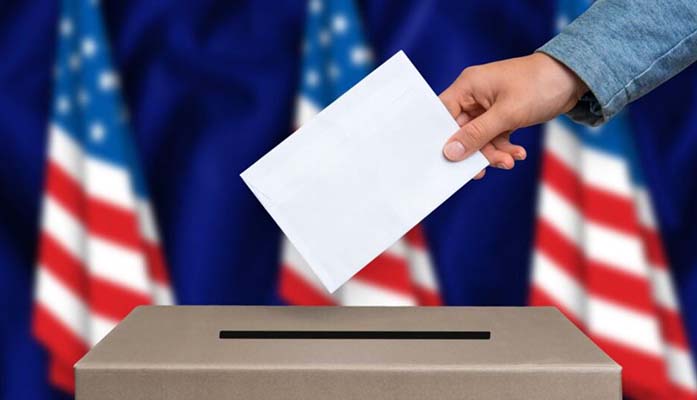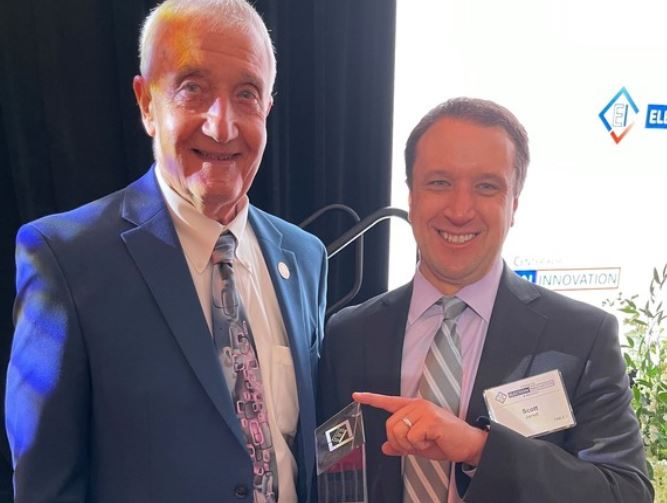
by Matthew Holloway | Feb 28, 2025 | News
By Matthew Holloway |
A series of posts to X on Tuesday sparked a firestorm of controversy when Merissa Hamilton of Strong Communities Action-EZAZ.org made a bombshell allegation that Maricopa County Election officials were made well aware of the potential for printing and supply issues during the 2022 statewide elections. Hamilton alleged that county officials moved forward without addressing the issues, citing a series of emails detailing the Maricopa County GOP raising concerns to then-Recorder Stephen Richer and Maricopa County Board of Supervisors’ Election Manager Scott Jarrett.
The post gained national attention when it was shared by X owner and de facto head of the Department of Government Efficiency Elon Musk.
In the initial post Hamilton wrote, “Remember in 2022 when the nearly 70% of voting centers in Maricopa County failed on Election Day causing massive, long lines and voter disenfranchisement resulting in @KariLake and @AbrahamHamadeh barely losing? Maricopa County knew in advance their Election Day plan was set up for failure, and THEY LET IT FAIL!”
Hamilton noted that the emails were obtained for Strong Communities Action by The Gavel Project and civil rights activist and Arizona election attorney Ryan Heath saying, “Without his legal muscle we wouldn’t have secured it!”
In the thread that followed, Hamilton released several emails from then-Chairwoman of the Maricopa County Republican Committee Mickie Niland to Richer and Jarrett saying, “I remember hearing from Scott (Jarrett) at some point after the primary that there was a problem during the primary with some tabulators not reading correctly due to low ink. How long does it take you to get paper or ink to them if they run out? Is there a process for the voting locations to report when they are half out of paper? How far are the restocking trucks from the voting centers? Are you using the length of the lines to help you determine when more supplies are brought to the centers?“ She also asked if there was any way she could help.
Jarrett responded, “We’ve been monitoring turnout and are prepared,” adding that there was plenty of ballot paper and normal paper to print control slips as well as “sufficient toner and printer drums.”
Hamilton explained, “Several days ahead of Election Day, the Maricopa County GOP leadership warned Maricopa County that their Election Day plan would fail and disenfranchise voters. The Maricopa County BOS Election Director Scott Jarrett insisted everything would be fine saying he was ‘confident.’”
Niland, representing the Maricopa County GOP, even followed up with an email warning, “Trust is low and voting in person is the topic everyone wants to discuss with us. To us if you are basing your decisions off of history, we think things are different now.” Niland added, “Please consider this email the official raising of that flag.”
According to an investigation of the 2022 Maricopa County Election, former Arizona Supreme Court Chief Justice Ruth McGregor found that “many of the Oki B432 printers were not capable of reliably printing 20-inch ballots on 100-pound paper under election-day conditions.”
McGregor added, “The combined effect of the heavy paper, longer ballot, and intermittent burst of print demand pushed the printers to perform at the very edge of or past their capability, so that any decrease in fuser performance in an individual printer could result in problems.”
Replying to the post by Musk, Hamilton thanked the X owner for “bringing attention to this vital matter!” She also raised allegations that Maricopa County Board of Supervisors Chairman Thomas Galvin has blocked newly elected County Recorder Justin Heap from accessing “the IT staff and responsibilities assigned to him in AZ law to secure and run our elections!”
Later in the afternoon, Maricopa County published a post to X that outlined the October 2024 agreement, which demarcated the election responsibilities of the Board of Supervisors and the Recorder’s Office. Galvin shared the post as well.
Matthew Holloway is a senior reporter for AZ Free News. Follow him on X for his latest stories, or email tips to Matthew@azfreenews.com.

by Jeff Caldwell | Oct 4, 2023 | Opinion
By Jeff Caldwell |
Have you ever shown up to vote and were told at the voting location that your voting information does not match the information on your driver’s license? If this has happened to you, have you wondered if your vote was counted?
We finally know why this happens! And there’s someone fighting for you!
EZAZ.org put out a Call to Action for its Grassroots to speak at the Maricopa County Board of Supervisors Meeting on September 27. One of the talking points included that voters are unknowingly being re-registered as a different political party or even in a different county than the county they live in. One of the commenters utilized this talking point.
Maricopa County’s legal team followed up by stating that during the MVD and Service Arizona process, when someone re-registers their vehicle in another county, sometimes the opt-out box is mischecked and changes voter registration without the voter knowing. Maricopa County Elections Director, Scott Jarrett, agreed.
Yes, this is the same elections department run by Maricopa County Recorder Stephen Richer. Both offices stated that the MVD and Service Arizona process is allowed under state statute. They are saying their hands are tied, and they can’t do anything about it.
This means that a voter could get mismatched information or be registered under the wrong party affiliation for something like re-registering a vehicle, registering a new vehicle, or getting a new license… And the voter wouldn’t even know until it’s too late!
So, then what would happen? If someone shows up to vote and their voting registration information is different from the information on their driver’s license, the voting location provides what is called a provisional ballot.
The Arizona Secretary of State’s Office says, “Provisional ballots are a fail-safe measure designed to ensure that all eligible voters have their ballots counted.” The county is supposed to go back and determine if voters who cast provisional ballots were legal and then count the ballots of those who are legal. But if provisional ballots are such a fail-safe measure, then consider this.
There are currently over 9,000 provisional ballots not counted in the Arizona Attorney General race. Abe Hamadeh is still fighting in the courts because his team has discovered many of these voters tend to vote in every election and some were mysteriously re-registered in another county. There are only 280 votes separating Mayes from Hamadeh.
Abe’s team has been trying for months to get access to the envelopes of provisional ballots to verify information of those who did cast a vote in such a way, but the counties have not allowed this to happen. This is ridiculous!
It’s time for the MVD and Service Arizona to change its misguided process. And it’s time for the courts to force the counties to allow Abe’s team to inspect the provisional ballot envelopes. After all, real election integrity ensures that every legal vote is counted.
Jeff Caldwell currently helps with operations at EZAZ.org. He is also a Precinct Captain, State Committeeman, and Precinct Committeeman in Legislative District 2. Jeff is a huge baseball fan who enjoys camping and exploring new, tasty restaurants! You can follow him on X here.

by Corinne Murdock | Dec 20, 2022 | News
By Corinne Murdock |
Maricopa County Supervisor Jack Sellers capped off his year-end newsletter by celebrating a “Defender of Democracy” award from a Big Tech-funded, election-influencing nonprofit.
Sellers received the award in July alongside Elections Director Scott Jarrett and outgoing Secretary of State/governor-elect Katie Hobbs’ assistant secretary of state-turned-chief of staff, Allie Bones. The Center for Election Innovation & Research (CEIR) issued the awards. CEIR received $69.5 million from Facebook founder Mark Zuckerberg and his wife, Priscilla Chan, in August 2020 through the Chan Zuckerberg Initiative — three months before the contentious presidential election.
Ultimately, CEIR gave nearly all of those funds — over $64.2 million — to state and local government officials to encourage mail voting and enhance voter information. Arizona received nearly $4.8 million. That was on top of other Big Tech monies that Arizona’s election officials received. As AZ Free News reported last March, the Center for Technology and Civic Life (CTCL) issued $5 million to the state. $3 million went to Maricopa County specifically.
The founder and executive director of CEIR is former DOJ lawyer David Becker. He disputed that CEIR’s funds swayed the 2020 election. CEIR reported that 85 percent of the funds were used for paid media, while 11 percent were for direct mail and 4 percent were for communications activities.
Further details about what the media entailed weren’t provided. The general report bears some similarities to CTCL’s vagueness concerning the expenditures of its funds.
Arizona was one of 23 states to receive CEIR grants. The others were Connecticut, $2.1 million; Florida, $287,000; Georgia, $5.6 million; Illinois, $2.7 million; Iowa, $1 million; Kentucky, $1.6 million; Maryland, $575,000; Massachusetts, $200,000; Michigan, $12 million; Minnesota, $1.5 million; Missouri, $1.1 million; New Jersey, $6.1 million; New Mexico, $768,000; New York, $5 million; North Carolina, $1.1 million; Ohio, $1.1 million; Pennsylvania, $13.2 million; Rhode Island, $632,000; South Carolina, $1 million; Vermont, $312,000; and Washington, $405,000.
Washington, D.C. received over $800,000.
READ THE CEIR REPORT HERE
The Chan Zuckerberg Initiative hasn’t publicly announced any funds it gave, if any, for this recent election.
While serving in the Civil Rights Division Voting Section in the early 2000s, Becker enforced the Voting Rights Act. The DOJ acting head at the time, Brad Schlozman, told reporters in 2020 that Becker should’ve been disbarred for unethical behavior. Schlozman described Becker as a “hard-core leftist” who “couldn’t stand conservatives.” Becker didn’t dispute the claims against him for unethical behavior, but noted that they were dismissed.
Other election officials to receive CEIR’s award included election officials from Colorado, Florida, Georgia, Michigan, Nevada, North Carolina, Pennsylvania, Wisconsin, and Philadelphia County, Pennsylvania. Other recipients of the award included lawyers from the Election Official Legal Defense Network, two former officials with the Cybersecurity and Infrastructure Security Agency, and two retired federal judges.
Two journalists also received the award: Reuters reporters Linda So and Jason Szep, for a series titled “Campaign of Fear: The Trump world’s assault on U.S. election workers.”
Corinne Murdock is a reporter for AZ Free News. Follow her latest on Twitter, or email tips to corinne@azfreenews.com.



